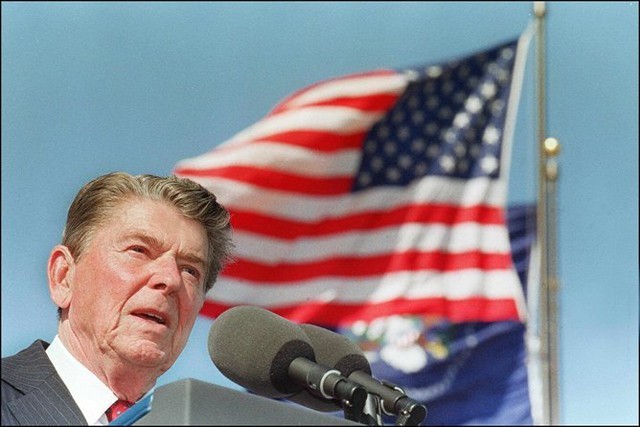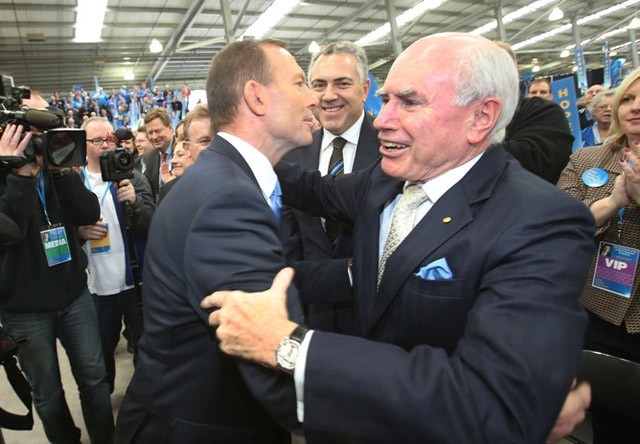Just how ‘liberal’ is the Liberal Party of Australia? AAP/David Crosling
Australia is one of the few countries in the world where one can call oneself a liberal and mean it.
There is a Liberal Party here which at least purports to stand for individual rights and limited government.
These used to be the twin pillars of political liberalism.
The 1960s happened, to cut a long story short, and instead liberalism is now identified with group rights – deriving from class, race, gender, and sexual preference – and expansive government – in order to dispense benefits and make us more equal.
Old-style liberals claim that individual rights exist irrespective of government – are unalienable – and government must not invade them.
Seeking equality at the expense of liberty realises neither.
New-style liberals believe government must actively extend rights to previously excluded groups and that equality is indisputably a moral good.
The modern Liberal Party of Australian is not wholly the former and none of the latter.
On issues like gay marriage, for example, some Liberal politicians have argued that there is an individual right to marry that government has no power to abrogate.
Some new-style liberals – or progressives – believe the government should actively promote, not merely tolerate, gay marriage.
Some old-style liberals would prefer the government not interpose itself into the bedroom. Some progressives, with an irony they elide, want government to explicitly approve of what goes on there.
Australian politics is perennially divided on how powerful the central government should be.
The Liberal Party, by and large, is sceptical that government is always the solution to what ails us.
The Labor Party, by and large, invests significant faith in public policy to improve society. Liberals want smaller government, Labor want bigger.
At least in theory. Even a cursory glance at Australian history reveals Liberal governments keen to extend federal government power – John Howard and his war on terror, for example.
But unlike their progressive opponents, Liberals at least have a conscience about it.
They feel a slight unease when Canberra stigmatises smokers. The next Liberal PM may not repeal this law but he should worry about the precedent it sets. If cigars, why not sausages?
For some of these reasons how Liberals relate to political power is more interesting than how do progressives.
This might be one explanation why the Obama administration is so enervating. There is little tension between what Barack Obama wants and his means to realise it. He believes in power, holds it, and wants to use it.
In contrast, for an old-style liberal, holding power is angst-inducing.
‘My philosophy is to eschew federal power but what I do with it defines my legacy.
If I am irresolute in its use I quiet my conscience but at the price of my career.’ For this reason, conservatives often offer a much more compelling case study of political power.
Think of the drama inherent in the presidencies of Abraham Lincoln, Richard Nixon, and Ronald Reagan.
Some of the most decisive uses of federal power in US history where made by men cool on that power.

The reigns of conservative leaders like Ronald Reagan generally have more inherent drama around the role of government. EPA/J. David Ake
Progressive leaders, with a few exceptions, are less interesting. The great crisis of the Clinton years emanated from his trousers.
Gillard’s prime ministership was defined by a personality battle with Kevin Rudd.
Both these leaders were content to use federal power to fashion the ‘good society’.
Gillard touted the 500+ pieces of legislation she enacted as if quantity of law is proportionate to progress.
For big L Liberals and conservatives, federal law is a more problematic tool.
Tony Abbott is instinctively much happier with an analysis of government as the source of the problem.
His conservatism (his old-style liberalism) is informed by a scepticism that centralised power can really enhance individual rights.
Climate change is a gift to progressives – a means to extend governmental power into the minutia of citizen behaviour and an opportunity to craft international governance regimes; it is a curse to Liberals for the same reason.
Major legislation for Liberals is WorkChoices – i.e., an attempt to reduce federal protection (and power).
Major legislation for Labor progressives is a carbon tax, disability insurance, cigarette packaging, Gonski, and the myriad other laws that are the raison d’être of progressive statecraft – all predicated on the expansion of federal control.
It is entirely appropriate that the two big sides in Australian, American and indeed all democratic politics should divide on the question of power.
The wonder is that the modern Labor party has been riven not by an ideological clash over the uses of power but a personal one between two compromised leaders, both claiming they are better placed to defeat an ideological opponent.
Author: Timothy Lynch
Publication: The Conversation
Date: 1 July 2013

